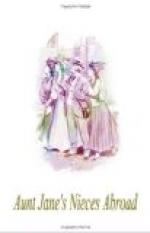“I do not question it.”
“Our legends tell of how my great ancestors demanded tribute of the rich who passed through their domain—for all this end of Sicily was given to us by Peter of Aragon, and remained in our possession until the second Ferdinand robbed us of it. Those times were somewhat wild and barbarous, signore, and a gentleman who protected his estates and asked tribute of strangers was termed a brigand, and became highly respected. But now it is different. We are civilized and meek, and ruled most lovingly by Italy. They will tell you there is no brigandage in all Sicily.”
“So I understand.”
“To-day I am nobody. My very name is forgotten. Those around this mountain know nothing of my little estate, and I am content. I desire not glory: I desire not prominence; to live my life in seclusion, with the occasional visit of a friend like yourself, is enough to satisfy me.”
“You seem well known in Taormina.”
“Quite a mistake, signore.”
“And the natives must have climbed these peaks at times and looked down into your secluded kingdom.”
“If so, they have forgotten it.”
“I see.”
“I give to the churches and the poor, but in secret. If I have an enemy, he disappears—I do not know how; no one knows.”
“Of course not. You are an improvement on your ancestors, Duke. Instead of being a brigand you belong to the Mafia, and perform your robberies and murders in security. Very clever, indeed.”
“But again you are wrong, signore,” replied the Duke, with a frown. “I have never known of this Mafia, of which you speak, nor do I believe it exists. For myself, I am no robber, but a peaceful merchant.”
“A merchant?” returned Uncle John, surprised by the statement.
“To be sure. I have some ancient and very valuable relics in my possession, treasured most carefully from the mediaeval days. These I sell to my friends—who are fortunately all foreigners like yourself and can appreciate such treasures—and so obtain for myself and my family a modest livelihood.”
“And you expect to sell something to me?” asked Uncle John, understanding very well the Sicilian’s meaning.
“It is my earnest hope, signore.”
The American fell silent, thinking upon the situation. The fierce looking brigand beside him was absurd enough, in his way, but doubtless a dangerous man to deal with. Uncle John was greatly interested in the adventure. It was such a sharp contrast to the hum-drum, unromantic American life he had latterly known that he derived a certain enjoyment from the novel experience. If the girls did not worry over his absence he would not much regret his visit to Il Duca’s secluded valley.
It was already midday, and his nieces would be expecting him to luncheon. When he did not appear they would make enquiries, and try to find him. It occurred to him how futile all such attempts must prove. Even to one acquainted with the mountain paths the entrance to the duke’s domain was doubtless a secret, and the brigand had plainly hinted that the native Sicilians were too cautious to spy upon him or molest him in any way.




